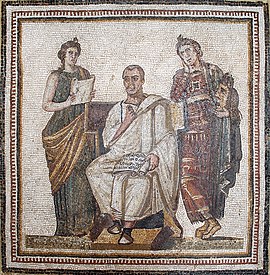| Virgil Mosaic | |
|---|---|
 Virgil Mosaic | |
| Artist | Unknown |
| Medium | Mosaic |
| Location | Bardo National Museum, Le Bardo |
The Mosaic of Virgil is a mosaic found on the site of the ancient Hadrumetum and currently preserved in Bardo National Museum in Tunis, where it constitutes one of its key pieces. It is currently the oldest portrait of the Latin poet Virgil.[ citation needed]
History
The mosaic [1] was discovered in 1896 in a garden of Sousse and constitutes the emblem of a larger mosaic.[ citation needed]
Description
It is included in a frame of 1.22-meter side. [2]
Central character


It represents the Roman poet Virgil, dressed in a white toga decorated with embroidery.
The poet holds in his hand, which is placed on his knees, a roll of parchment on which are written extracts of the Aeneid, more precisely the eighth verse: [3] "Musa, mihi causas memora, quo numine laeso, quidve..."
Muses
He is surrounded by the muses Clio and Melpomene: Clio, the muse of history, is placed on the left of the poet and shown reading, while Melpomene, the muse of tragedy, is holding a tragic mask.
Interpretation
The work is the oldest known representation of the poet to date. Some have seen it, according to Mohamed Yacoub, a representation of the owner of the house, passionate about the poet.[ citation needed] The dating of the pavement ranged from 1st to 4th century but can not exceed the 3rd century, due to the archaeological context of its discovery according to the same author. [4]
See also
References
Bibliography
- Aïcha Ben Abed-Ben Khader, Le musée du Bardo, éd. Cérès, Tunis, 1992
- Mohamed Yacoub, Le Musée du Bardo : départements antiques, éd. Agence nationale du patrimoine, Tunis, 1993
- Mohamed Yacoub, Splendeurs des mosaïques de Tunisie, éd. Agence nationale du patrimoine, Tunis, 1995 ISBN 9973917235
External links
- Paul Gauckler, « Mosaïques découvertes à Sousse », CRAI, vol. 40, n°6, 1896, pp. 578–582
- Jean Martin, « Le portrait de Virgile et les sept premiers vers de l'Enéide (pl. XIII-XIX) », Mélanges d'archéologie et d'histoire, vol. 32, n°32, 1912, pp. 385–395
- Gérard Minaud, « Des doigts pour le dire. Le comput digital et ses symboles dans l'iconographie romaine », Histoire de la mesure, vol. XXI, n°1, 2006
- M. Nowicka et Z. Kiss, « Autour du portrait de Virgile à Sousse », Studia i Prace, vol. 15, 1990, pp. 303–307
| Virgil Mosaic | |
|---|---|
 Virgil Mosaic | |
| Artist | Unknown |
| Medium | Mosaic |
| Location | Bardo National Museum, Le Bardo |
The Mosaic of Virgil is a mosaic found on the site of the ancient Hadrumetum and currently preserved in Bardo National Museum in Tunis, where it constitutes one of its key pieces. It is currently the oldest portrait of the Latin poet Virgil.[ citation needed]
History
The mosaic [1] was discovered in 1896 in a garden of Sousse and constitutes the emblem of a larger mosaic.[ citation needed]
Description
It is included in a frame of 1.22-meter side. [2]
Central character


It represents the Roman poet Virgil, dressed in a white toga decorated with embroidery.
The poet holds in his hand, which is placed on his knees, a roll of parchment on which are written extracts of the Aeneid, more precisely the eighth verse: [3] "Musa, mihi causas memora, quo numine laeso, quidve..."
Muses
He is surrounded by the muses Clio and Melpomene: Clio, the muse of history, is placed on the left of the poet and shown reading, while Melpomene, the muse of tragedy, is holding a tragic mask.
Interpretation
The work is the oldest known representation of the poet to date. Some have seen it, according to Mohamed Yacoub, a representation of the owner of the house, passionate about the poet.[ citation needed] The dating of the pavement ranged from 1st to 4th century but can not exceed the 3rd century, due to the archaeological context of its discovery according to the same author. [4]
See also
References
Bibliography
- Aïcha Ben Abed-Ben Khader, Le musée du Bardo, éd. Cérès, Tunis, 1992
- Mohamed Yacoub, Le Musée du Bardo : départements antiques, éd. Agence nationale du patrimoine, Tunis, 1993
- Mohamed Yacoub, Splendeurs des mosaïques de Tunisie, éd. Agence nationale du patrimoine, Tunis, 1995 ISBN 9973917235
External links
- Paul Gauckler, « Mosaïques découvertes à Sousse », CRAI, vol. 40, n°6, 1896, pp. 578–582
- Jean Martin, « Le portrait de Virgile et les sept premiers vers de l'Enéide (pl. XIII-XIX) », Mélanges d'archéologie et d'histoire, vol. 32, n°32, 1912, pp. 385–395
- Gérard Minaud, « Des doigts pour le dire. Le comput digital et ses symboles dans l'iconographie romaine », Histoire de la mesure, vol. XXI, n°1, 2006
- M. Nowicka et Z. Kiss, « Autour du portrait de Virgile à Sousse », Studia i Prace, vol. 15, 1990, pp. 303–307